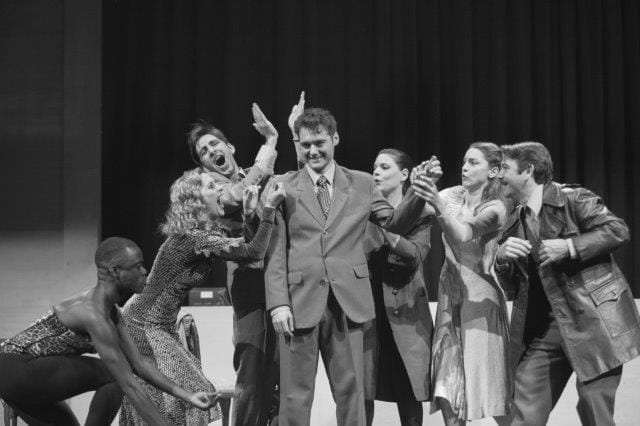If the National Theatre of Greece had staged Mephisto, say, five years ago, the show wouldn’t have the resonances that it has for the Athenian audiences today. In a country that has been flirting with bankruptcy for more than four years, with the subsequent rise of fascist symptoms as a direct result of the political vacuum and social despair, the spectators today would probably recognize in the humiliated and economically brought to its knees post-WW I Germany, their own society.
Ariane Mnouchkine, an influential French director and founder of the Theatre du Soleil, adapted for the stage Klaus Mann’s novelMephisto (1936) and directed it in Berlin in 1979. In Mephisto, the political developments in Germany between 1923 and 1936 and their impact on society are seen through the eyes of a troupe of actors. Hendrik Höfgen, the central character in the play (in reality Gustaf Gründgens, Mann’s brother-in-law), is a young, ambitious actor of low social background and high aspirations; an opportunist, who manages, despite being a communist and a homosexual, not only to survive in the Nazi Germany but also – by allying with the Nazis – to become the head of Hitler’s Berlin State Theatre. Much like Faust’s Mephistopheles his soul is, of course, the price – if that has any value at all.
Director Nikos Mastorakis (also the set designer of his show) puts onstage an impressive, bright-coloured theatre set, on and in front of which the plot unfolds. This theatre within the theatre device further serves the explicit metatheatricality of the play. The characters are actors in the Hamburg Artists’ Theater; as such, they act and then discuss their roles, they exchange ideas about politics and the role of theatre, they make plans. At the same time, breaking the boundaries between character and role, they address the audience (“Ladies and Gentlemen, my colleagues and me tonight will try to present you a novel”, or, “I am not Klaus Mann, I am an actor playing Klauss Mann”), regularly commenting on or narrating the plot.
Mastorakis’ meticulous and subtle direction matches with a wonderful 20-member cast in a show that boasts exceptionally memorable performances. The young and much promising Harris Frangoulis (Klaus Bruckner) is captivating; so is Thanos Tokakis in the leading role – although his physique doesn’t allude to one that has made a Faustian bargain with the devil. Marina Aslanoglou gives a sturdy and stable performance as Erika Bruckner, Maria Zorba and Nikos Psarras make a wonderful couple as Myriam and Magnus Gottschalk. Ivonni Maltezou, Konstantina Takalou and Youlika Skafida, three actresses from different theatrical generations, offer very high quality acting.
All in all, Mastorakis’ Mephisto, a show that is now being repeated after its successful run in the Municipal Theatre of Piraeus last June, is one of the fine moments of the Greek National Theatre.

